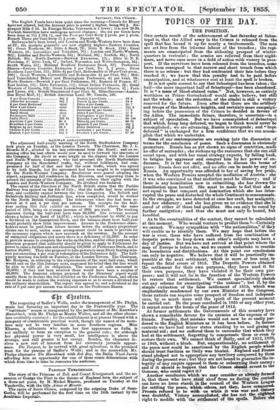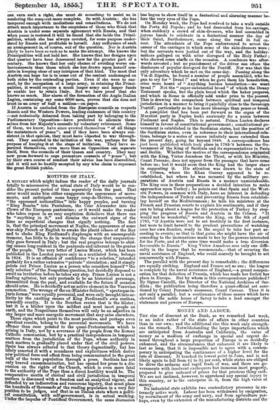TOPICS OF THE DAY.
THE POSITION.
ONE certain result of the achievement of last Saturday at Sebas- topol is, that the Allied army in the Crimea is released from the spell that has bound it up for nearly a twelvemonth. The men are set free from the irksome labour of the trenches ; the regi- ments are emancipated from the sickening prospect of winter- quarters in restraint ; the armies are relieved from their night- mare, and move once more in a field of action with victory in pros- pect. If the survivors have been released from the trenches, some have been consigned to that narrow and short trench from which there is no release : but they had confronted their fate before they reached it ; we knew that this penalty had to be paid before emancipation, and at whatsoever cost at least the spell is broken.
It is not quite correct to say that Sebastopol has been taken ; the half—the more important half of Sebastopol—has been abandoned. It is " a mass of blood-stained ruins." Not, however, so entirely worthless as Prince Gortschakoff would make believe, but still
not the whole; and the reduction of the citadel is still a victory reserved for the future. Even after that there are the artillery and troops of the Mackenzie heights, and certainly more campaign- ing before the possession of the Crimea be decided in favour of the Allies. The immediate future, therefore, is uncertain—is a subject of speculation. But we have accomplished at Sebastopol that which, being long deferred, we began to think would never be accomplished; we are advancing, Russia is retrograde; and " hope deferred " is exchanged for a firm confidence that we can acoom- plish that which we undertake. Some of our contemporaries are rushing into the discussion of
terms for the conclusion of peace. Such a discussion is obviously premature. Russia has as yet shown no signs of contrition, made no offer of surrender ; she reckons up the resources that she can still count upon, and with her usual strategy expects, by falling back, to fatigue her aggressor and conquer him by her power of en- durance. It is far too early, therefore, to discuss the terms of peace : Russia does not offer, and no offer can be made by any but Russia. An opportunity was afforded to her of saving her pride, when the Western Powers accepted the mediation of Austria : she it was who convinced us that mediation must be illusory ; and if there is any humiliation now in submitting, she has drawn the humiliation upon herself. She must be made to feel that she is not equal to that conquest and domination which she has inter- rupted the peace and disturbed the whole Continent to consummate. In the struggle, we have detected at once her craft, her malignity,. and her obduracy ; and she has given us no evidence that she is cured of either of those bad qualities. She can only be cured by further castigation ; and thus she must not only be bound, but humbled.
As to the eventualities of the contest, they cannot be calculated
at this moment. Who would venture to predict them ?—Certainly we cannot. We may sympathize with "the nationalities," if they will enable us to identify them. We may hope that before the war is over, those who have suffered from the combination of despotic powers to keep down each other's subjects may have a day of justice. But wa have not arrived at that point where the map of Europe is before us, and we cannot undertake to resettle its boundaries and distributions. At this point our conclusions- can only be negative. We believe that it will be practically im- possible at the next settlement, which is more or less near, to repeat the fatal errors of 1815. The Despotic Powers obtained the settlement for their own purposes, they have used it for their own purposes, they have violated it for their own pur- poses; and it will not lie in the function of the Western Powers to restore that settlement. We cannot speculatively sketch out any scheme for emancipating "the nations"; but if, by the simple extinction of the false settlement of 1815, which was emphatically condemned by our own Minister at ;the Congress, those nations can acquire some prospect of freedom and independ- ence, by so much more will the spirit of the present moment be carried out. Be the peace concluded in 1855 or any other year, it cannot renew the terms of the peace of 1815.
At former settlements the Governments of this country have
shown a remarkable favour for its enemies at the expense of its friends. Possibly, that mistake would not now be so easily par- doned to the English Ministers as it has been before. In former contests we have had minor states standing by us and giving us material aid; and we suffered them to surrender that which they had at the settlement, forgetting to compensate them or even to restore their own. We cannot think of Sicily, and of 1812, 1820, or 1848, without a blush. But, unquestionably, no settlement of the peace now could be sanctioned by the English people which should treat Sardinia as Sicily was treated. England and Frame stand pledged not to appropriate any territory conquered by them during the present war ; but they are not bound to guarantee the in- tegrity of any empire opposed to them or subserving their enemy; and if it should so happen that the Crimea &mild revert to the Genoese, who could regret it P
Another conclusion which we may consider as ah'eady formed
is, that those who have stood aloof from us during the contest can have no locus standi in the council of the Western Toeagus for settling the peace, villch others, not they, have conquered. Prussia refused to be with us while it was war and vistory was doubtful. Victory accomplished, she has not the allb44616" right to meddle with the settlement of the spoils. Before she
can earn such a right, she must do something to assist us in Pandering the conquest more complete. So with Austria : she has tampered enough with mediations and consultations. We do not attach much importance to the suspicions of those who think that Austria is under some separate agreement with Russia, and that when peace is restored it will be found that she holds the Princi- palities, which she has always coveted, for some purpose under- stood by Russia and profitable to herself. Any sufferance of such an arrangement is, of course, out of the question. Nor is Austria likely to have been so rash as to make the attempt. She knows the Principalities will not hold her. She knows that her designs upon that quarter have been denounced now for the greater part of a century. She knows that her only thanes of avoiding worse em- barrassments than those which she has drawn upon herself con- sists in keeping clear of any intrigues of that kind. The most that Austria can hope for is to oonse out of the contest undamaged on both sides by the contending parties. Even if she were to suc- eeed, by the occupation of a large army, in retaining the Princi- palities, it would require a much larger army and larger funds to enable her to retain Italy. But we have proof that she knows as much. Her alarm at the formation of the Anglo-Italian Legion, containing say some 6000 men, proves that she does not trust in an army of half a million—onpaper.
If Austria is excluded from the European councils as respects Russia and the Western Powers, leading statesmen of this country —not technically debarred from taking part by belonging to the Parliamentary Opposition—have preferred to alienate them- selves from her Majesty's councils by voluntary retirement. Some of them, we know, have since avowed themselves " of all things the maintainers of peace"; and if they •have been always con- sistent in that opinion, they must have objected to war through- out. They assisted in the initiation of the war, perhaps for the purpose of keeping it at the stage of initiation. They have se- parated themselves, even more than an Opposition can separate itself, from the councils of their Queen and country. They may now press forward to urge premature counsels of " peace' but by their own course of eanduct their advioe has been discredited, and it will not be hastily accepted by any who claim to represent the great British public.



























 Previous page
Previous page